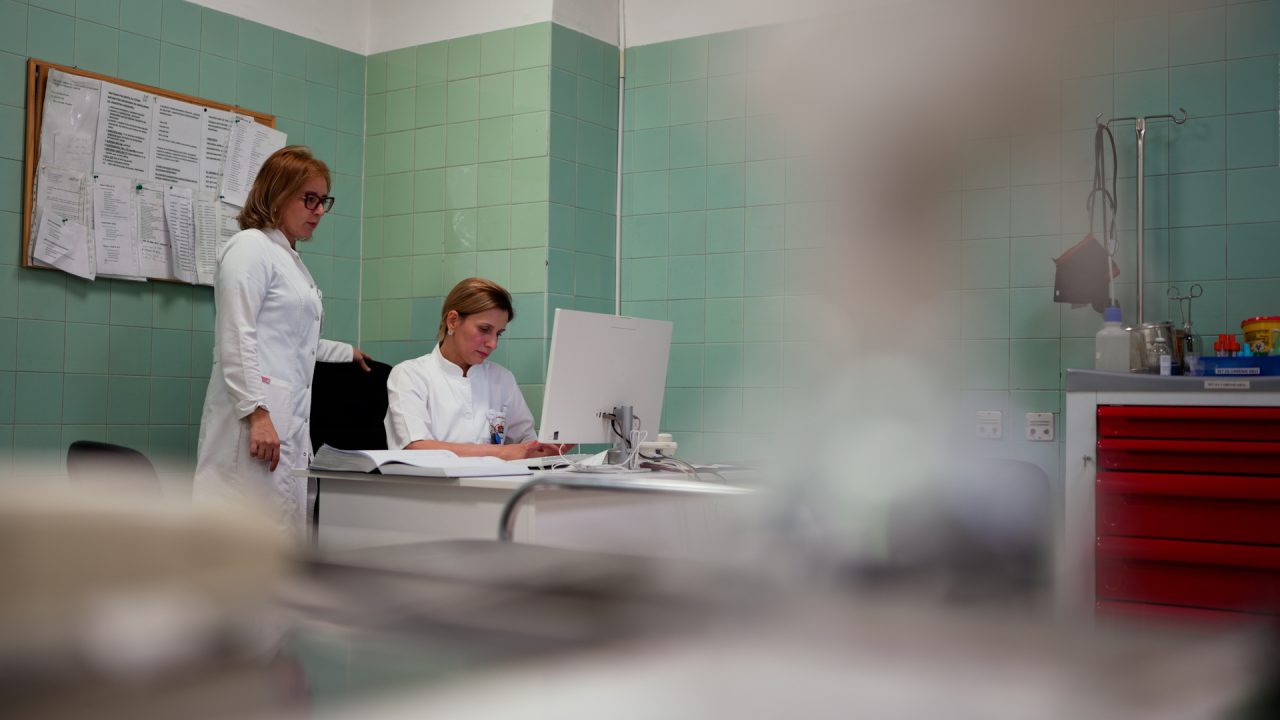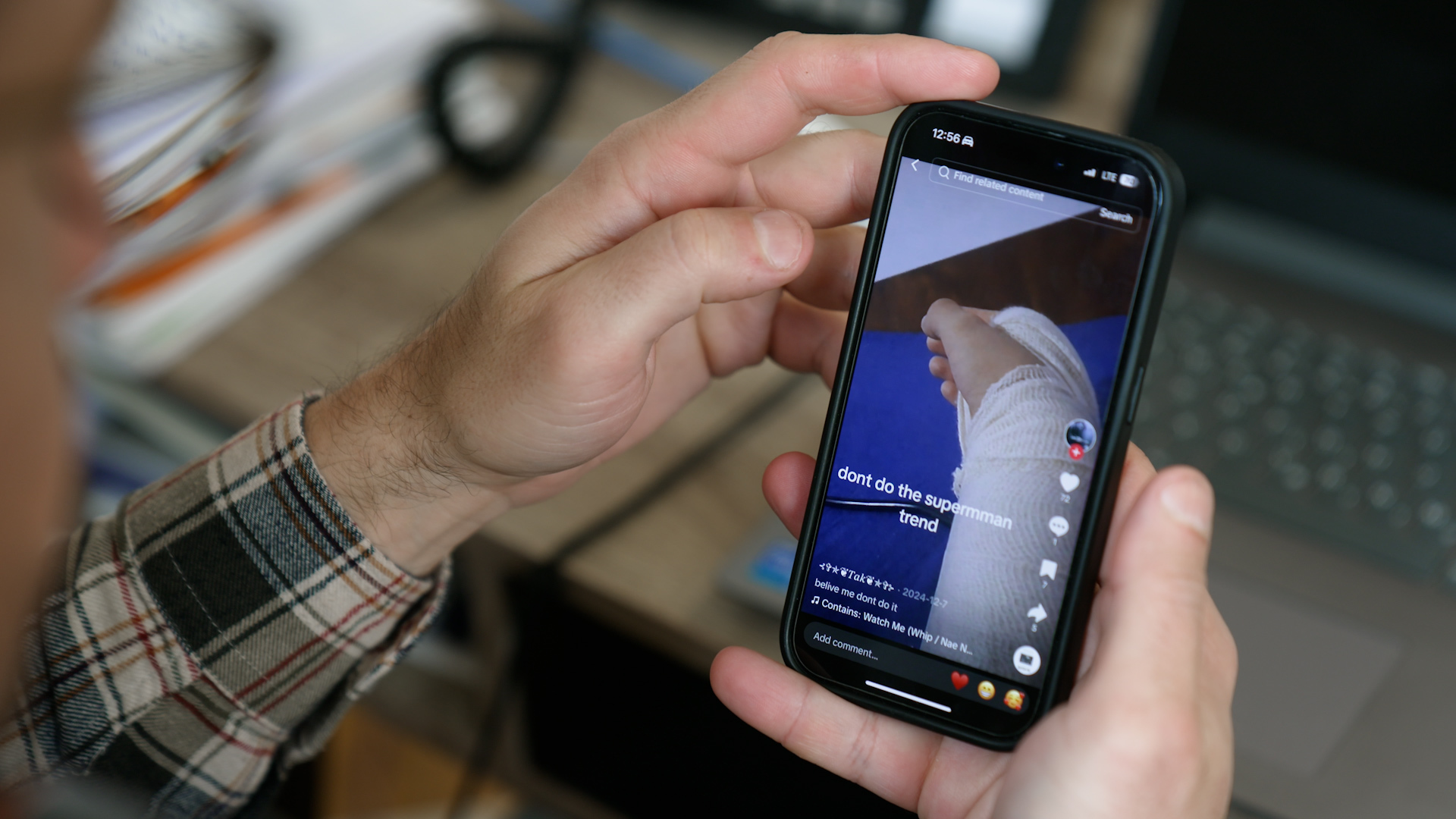This post is also available in: Bosnian
On social media, one of the doctors saw a video of a child with a broken arm describing how they had filmed a TikTok challenge, an increasingly common trend among teenagers worldwide.
“These were all serious injuries, injuries to the musculoskeletal system. The children who came to us had wrist fractures. They had all fallen forwards, landing on their fists,” Husnic told Detektor.
Several of them had attempted the so-called ‘Superman challenge’. The challenge involves people holding out their arms to catch someone as they do a Superman-style leap. But the catchers sometimes move their arms, letting the jumper fall and injure their hands.
Husnic explained that the injuries could have been even more disastrous had the participants thrown the children onto their backs during the challenge, as head and spine injuries could have occurred involving more long-term and serious consequences.
Psychologist Dzelila Mulic Corbo, who has experience working with adolescents, says that teenagers are usually not aware of any consequences, which makes the challenge even more dangerous.
“‘If I do that, this will happen’ – this is only for adults, while think the opposite: ‘I am going to do it, I will be cool. What happened to others who broke their arms will not happen to me. They were stupid, let’s say, but it won’t happen to me,’” she said.
Elma Dizdarevic, the president of the Parents’ Council of Sarajevo Canton, says that immediately after the first incident, the organisation alerted all parents to the TikTok challenge and involved them in an attempt to reduce the number of children trying it. Some of the parents started to talk publicly about the challenge on social media, but Dizdarevic says that they encountered an unexpected reaction.
“Each parent who told their story went through that experience again. In fact, everyone condemned them for not being good parents, while they definitely were good,” she said.
Because of this, some deleted their posts. Detektor tried to talk to several parents whose children suffered injuries, but none of them was prepared to talk about it publicly.
Dizdarevic believes that, in addition to supporting children, it is therefore necessary to also support the parents.
“Because we always wonder if we are really good parents,” she said.
In their initial reactions, parents and authorities have sought to prohibit children from using TikTok, or completely ban the social media outlet.
 Doctors at the General Hospital in Sarajevo. Photo: Detektor
Doctors at the General Hospital in Sarajevo. Photo: Detektor
Recently, Albanian Prime Minister Edi Rama announced that TikTok would be blocked in the country for at least a year. He described TikTok as a neighborhood bully, after a minor was killed after a clash on social media.
Blerjana Bino, a professor from Albania, says that the authorities have not been transparent with educators and the public. She said she is concerned that this could disrupt the balance between child protection on the internet and respect for fundamental rights online.
“There is a risk of digital censorship and a lack of transparency. We believe that this decision is not proportionate and that it did not follow a proper consultation process, and did not take into account independent supervisory institutions,” Bino said.
Although there are proposals to ban TikTok in Bosnia and Herzegovina, or to restrict access to it for those under 16 years of age, experts believe that a ban will not solve the problem and that different approaches are needed for children.
“Repressive measures should be reserved for repressive systems. And here, when it comes to adolescents, it requires flexibility, it requires us to understand, to agree, to revise boundaries; it requires us to enter their world as well,” said psychologist Mulic Corbo.
All social media outlets want to attract teenagers so that they can later sell them things through advertisements, marketing agency director Edin Halilovic explained. An algorithm that detects what attracts users helps them do this.
“That means that this week they will push whatever it is that interests you today. TikTok is changing a lot for its users, so in that respect there is a difference compared to the algorithms of, for instance, Facebook, Instagram and YouTube, which are more of a long-term nature,” Halilovic said.
One of the biggest criticisms of the social media outlet, experts point out, is the speed at which it recognises the habits of its young users and how quickly it gives them content that keeps them glued to their screens for longer.
“TikTok has a strategic plan for developing its work with its content creators, ie. people who generate content that is interesting or more interesting to users, so in that respect it’s in a better position compared to traditional social media,” Halilovic said.
 Challenges on the TikTok social network. Photo: Detektor
Challenges on the TikTok social network. Photo: Detektor
As psychologist Mulic Corbo points out, imposing rules on teenagers is difficult, because one of their impulses is to resist rules and restrictions.
“Whatever rules you set for a teenager, they will fight them – that is their developmental imperative – and, if you ask me, as a psychologist, as a psychotherapist, I would say that such a child is developing very well and healthily,” she said.
If there is a ban, some alternative should be offered to teenagers, she believes. It is particularly important not to judge the children who participated in challenges and to talk to them, so they understand the possible consequences in time and prevent injuries.
“The important part is how we talk to them – why do they do it, what are their goals, how should they think, what can happen, what happened to others, how would they feel if they were not involved in this challenge? It’s important, and I do not know if anyone has asked children how they would feel if they were not involved in it,” Mulic Corbo said.




